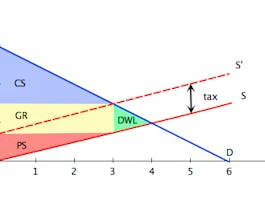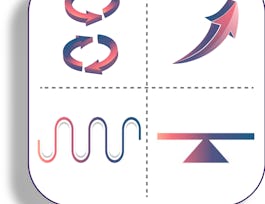Most people make the incorrect assumption that economics is ONLY the study of money. My primary goal in this course is to shatter this belief. During this course, we will be addressing the above questions as well as many more relating to:


Microeconomics Principles
Taught in English
Some content may not be translated
177,988 already enrolled
(2,950 reviews)
Recommended experience
What you'll learn
Identifying hidden costs of anything
Skills you'll gain
Details to know

Add to your LinkedIn profile
9 quizzes
See how employees at top companies are mastering in-demand skills


Earn a career certificate
Add this credential to your LinkedIn profile, resume, or CV
Share it on social media and in your performance review

There are 9 modules in this course
You will become familiar with the course, your classmates, and our learning environment. The orientation will also help you obtain the technical skills required for the course.
What's included
1 video4 readings1 quiz1 discussion prompt
Welcome to your first week in Microeconomics Principles! As you will quickly see, the things you learn in this class will probably help you see the world in a different way. Economics is not just about money, as you may have incorrectly assumed. On the contrary, as you will learn in this lesson, economics is about how society distributes scarce resources. And, since almost anything in the world is a scarce resource, from fossil fuels to suitable romantic partners, we can apply the rules of economics to pretty much anything.
What's included
6 videos1 reading1 quiz1 discussion prompt
Welcome to your second week in Microeconomics Principles! This module we will cover the hallmark framework of the field: the supply and demand model. I am sure that if you knew any economics words before enrolling in this course those two words were supply and demand. This module you will finally learn what all the fuss is about.
What's included
17 videos1 reading1 quiz1 discussion prompt
Welcome to Week 3! Last module we introduced the supply and demand model to explain how free markets work. One of the main concepts we learned about free markets was that they tend to gravitate toward an “equilibrium” price and quantity. This module we will use the same conceptual model to answer one important question: Are free markets the best way to distribute society’s resources?
What's included
10 videos1 reading1 quiz1 discussion prompt
Welcome to the fourth week! This module we will cover one of my favorite economics concepts: elasticity. It is one of my favorites because of how useful it is to analyze policy implications, as well as its usefulness for business managers. This will be obvious to you when you read one of the discussion topics for this module: Should we legalize marijuana?
What's included
14 videos1 reading1 quiz1 discussion prompt
Welcome to your fifth week! This module we will begin covering the theory of the firm, which will take us basically three modules to finish. Economists call this section of the course, "The Economics of the Lemonade Stand." And that title makes perfect sense, since the concepts we cover can be used by anyone, from someone owning a lemonade stand, to a car manufacturing company, to a hair salon, to a burrito stand, etc.
What's included
9 videos1 reading1 quiz1 discussion prompt
Welcome to your sixth week! This module we continue our discussion of the firm by focusing on those firms working in a perfectly competitive (or competitive) environment.
What's included
10 videos1 reading1 quiz1 discussion prompt
So, why is it that when you fly the person sitting next to you in the plane probably paid a different price for the ticket than what you paid for it? And why does Starbucks charge so much for its coffee even though you can buy coffee at Dunkin’ Donuts for almost half of that price? This module we are finishing our discussion of the firm by focusing on cases that should be more familiar to you than the perfect competition examples we have been using.
What's included
10 videos1 reading1 quiz1 discussion prompt
And so we have arrived at the last week. This course has gone too fast! This module we will be discussing market failures. A market failure is a situation when the market does not do a good job of distributing resources among members of society. In fact, in all of these cases the market IS the problem.
What's included
13 videos1 reading1 quiz2 discussion prompts
Instructor

Recommended if you're interested in Economics

University of Pennsylvania

Erasmus University Rotterdam

University of Pennsylvania

Rice University
Why people choose Coursera for their career




Learner reviews
Showing 3 of 2950
2,950 reviews
- 5 stars
82.47%
- 4 stars
14.34%
- 3 stars
1.42%
- 2 stars
0.60%
- 1 star
1.15%

Open new doors with Coursera Plus
Unlimited access to 7,000+ world-class courses, hands-on projects, and job-ready certificate programs - all included in your subscription
Advance your career with an online degree
Earn a degree from world-class universities - 100% online
Join over 3,400 global companies that choose Coursera for Business
Upskill your employees to excel in the digital economy
Frequently asked questions
Access to lectures and assignments depends on your type of enrollment. If you take a course in audit mode, you will be able to see most course materials for free. To access graded assignments and to earn a Certificate, you will need to purchase the Certificate experience, during or after your audit. If you don't see the audit option:
The course may not offer an audit option. You can try a Free Trial instead, or apply for Financial Aid.
The course may offer 'Full Course, No Certificate' instead. This option lets you see all course materials, submit required assessments, and get a final grade. This also means that you will not be able to purchase a Certificate experience.
When you enroll in the course, you get access to all of the courses in the Specialization, and you earn a certificate when you complete the work. Your electronic Certificate will be added to your Accomplishments page - from there, you can print your Certificate or add it to your LinkedIn profile. If you only want to read and view the course content, you can audit the course for free.
If you subscribed, you get a 7-day free trial during which you can cancel at no penalty. After that, we don’t give refunds, but you can cancel your subscription at any time. See our full refund policy.


